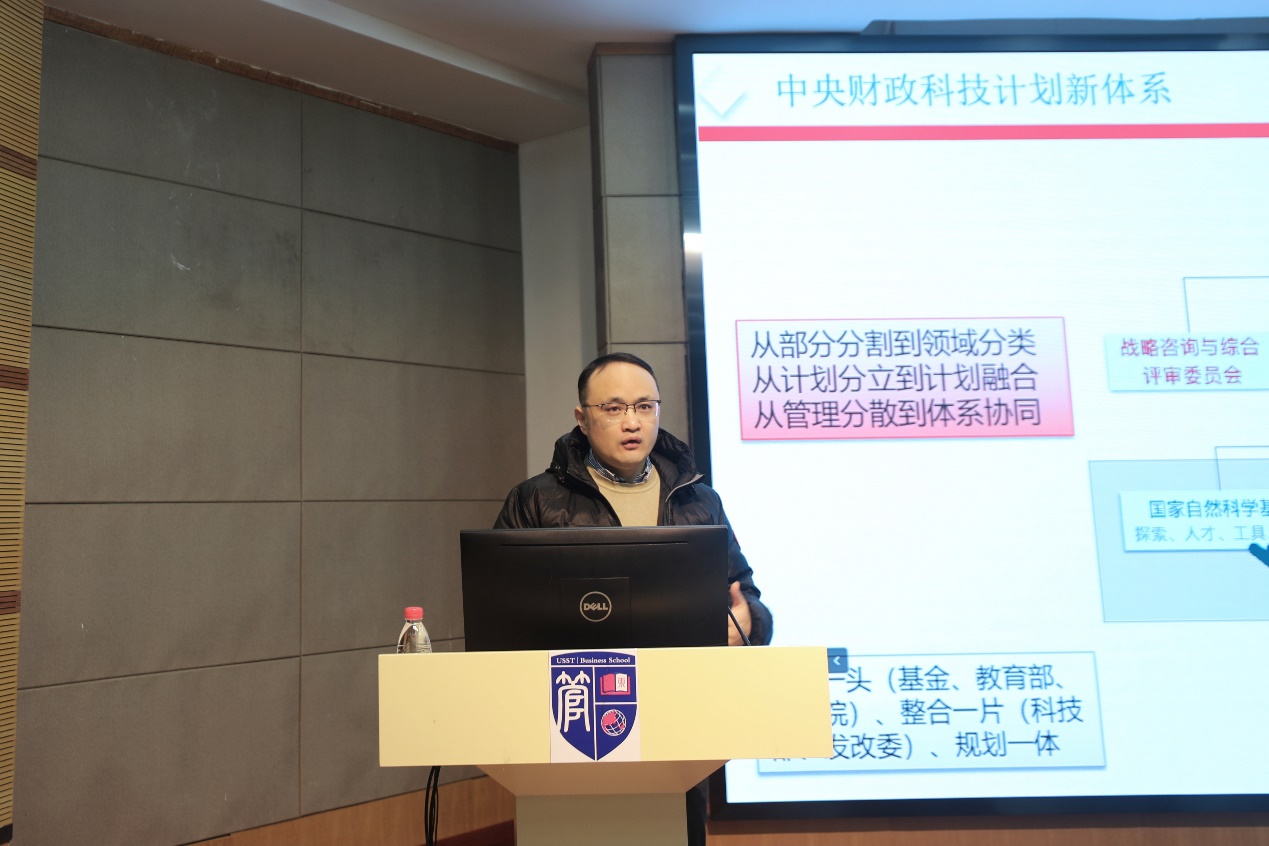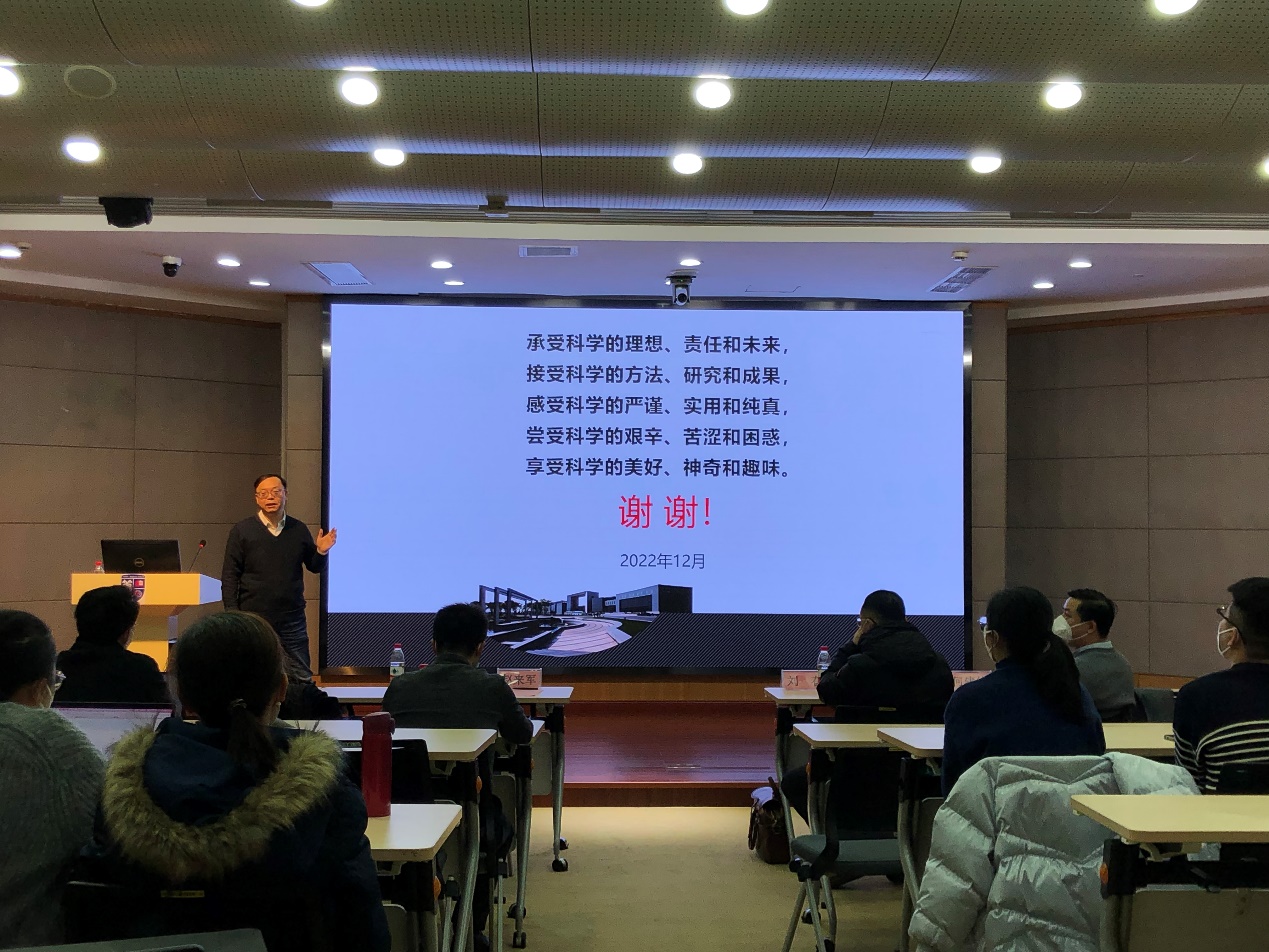In order to let teachers better understand the top-level design and evaluation process of National Natural Science Foundation of China (NSFC) policy and keep teachers' enthusiasm to apply foundation, the Business School held the NSFC policy interpretation and application in the lecture hall of the second conference room on the fourth floor on December 16. Professor Liu Chun, Vice Dean of Graduate School of Tongji University, Deputy Director of Key Laboratory of Ministry of Natural Resources, and Chief Scientist of National 13th Five-Year Plan, was invited to give a presentation to explain the policy and application experience of NSFC. The meeting was chaired by Dean Zhao Laijun and attended by more than 70 faculty members, including Vice Deans Zhang Zheng, He Jianjia and Zhao Jing, Ditector Fan Chongjun and Deputy Director Liu Yong of the Department of Information Management and Information Systems, Director Liu Qinming of the Department of Industrial Engineering, Director Liu Weiwei of the Department of Transportation Engineering, Director Tian Fa of the Department of Finance and Taxation, Deputy Director Xi Ning of the Department of System Science, and Deputy Director Qi Xiang of the Department of Public Administration.
Prof. Liu Chun introduced the new system of the central financial science and technology plan, the funding system of the National Natural Science Foundation of China (NSFC), the scientific research projects in Shanghai and the main problems of the current science and technology evaluation from a macro perspective, taking into account the preparation of national and provincial project submission guidelines and his own experience. Secondly, he explained the policy of NSFC in detail, introduced the evaluation process of the application, the scoring rules and the main reasons for not passing the evaluation. He pointed out that the writing of the application needs to condense the scientific problem, clarify the research idea, carefully check the references, clarify the requirements and purpose of each part, and answer why, what, how, and what conditions to do. In the selection of the topic, we should pay attention to the current international research hotspots, the title of the project should not be too big, and the title should be appropriately worded to aptly reflect the research content, be targeted and reflect innovation. The project should be based on clear logic, accurate scientific questions, clarify the background and significance, research status and analysis, propose the scientific problems to be studied, and give the basic ideas to solve the problems. Research goals need to be clear, concise, and scientifically directed, from big stories to small stories to limited goals. Where the project is innovative, there are usually no more than three innovations, which can be innovation in academic thinking, technological innovation, and methodological innovation, such as the discovery of new phenomena, the formulation of new hypotheses, the formulation of new ideas, and the use of brand-new technologies and methods. Finally, he shared with the teachers his experience of teaching and research work over the years, to bear the ideal, responsibility and future of science, and at the same time, to enjoy the beauty, magic and fun of science. After the meeting, several teachers actively participated in asking questions, and he answered them one by one.
This lecture is the third wave of National Foundation application counseling activities held by the School after the Academic Salon for National Natural Science and Social Science application and the Dean's Research Luncheon. Subsequently, the Business School will continue to carry out comprehensive and targeted counseling activities to help faculty members determine the selected topic as soon as possible, form the first draft of the application, and repeatedly refine it, so as to prepare for the application work in 2023.

Liu Chun was making presentation

Zhao Laijun was hosting
Introduction of Liu Chun:
Liu Chun, professor, doctoral supervisor, enjoys the special allowance of the State Council Government, vice president of the Graduate School of Tongji University, deputy director of the key experiment of modern engineering measurement of the Ministry of Natural Resources, chief scientist of the national 13th Five-Year Plan key research and development projects, national Ten Thousand People Plan” science and technology leading scientist, the national candidate of the Hundred Million Talents Project, the national young and middle-aged expert with outstanding contribution, the young and middle-aged leader of science and technology innovation of the Ministry of Science and Technology, the leader of science and technology of the Ministry of Natural Resources, and the excellent academic leader of Shanghai. He has presided over more than 30 national key R&D projects, key projects of National Natural Science Foundation of China, 973 projects, 863 projects, surface projects of National Natural Science Foundation of China and various provincial and ministerial key projects, and won the second prize of National Science and Technology Progress, the first prize of Shanghai Science and Technology Progress, the second prize of Ministry of Education, the second prize of Shanghai Science and Technology Progress, and the first prize of China Mapping Science and Technology Progress. First Class Award of China Mapping Science and Technology 3 times. He was the Deputy Director of Research Management Department and Deputy Director of Foreign Affairs Office of Tongji University.


